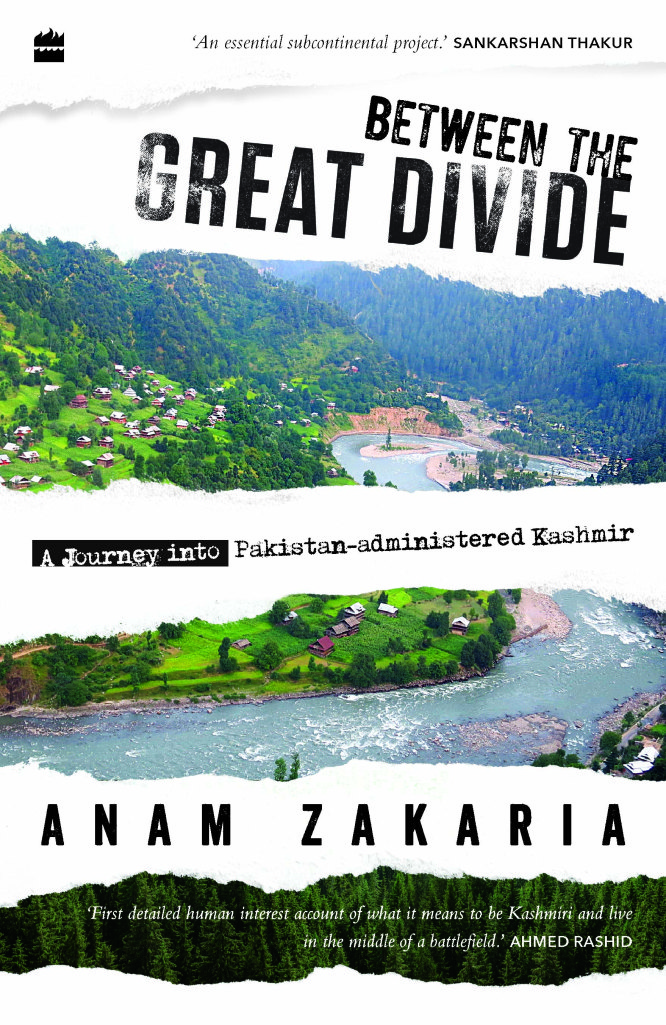

Between the Great Divide
“Between the Great Divide: A Journey into Pakistan-administered Kashmir,” is the second book of Anam Zakaria. She is an author, development professional and educationist with a special interest in oral histories, identity politics and narratives of conflict. Her first book, “The Footprints of Partition: Narratives of Four Generations of Pakistanis and Indians” (HarperCollins 2015) explores the shifting intergenerational perceptions of the 1947 Partition in India and Pakistan. This book won the German Peace Prize 2017.
Anam has an academic background in International Development from McGill University (Canada) and has previously worked as a director at The Citizens Archive of Pakistan, collecting oral histories from the Partition generation and religious minorities of Pakistan and connecting thousands of school children in India, Pakistan and the US through a cultural exchange program.
The main objective or the central theme of The Great Divide is to show how people of Pakistan Administered Kashmir perceive the ongoing conflict, the Kashmir dispute. The author describes the peoples’ perspective as an unsung, uncelebrated, unacknowledged and unobserved aspect of the Kashmir “conflict,” which is obviously less known globally whereas things get more highlighted from the Indian side of Kashmir owing to the Indian army atrocities against the Kashmiris.
Whereas ample literature is available on the Kashmir conflict and the turmoil going on especially since 1989, it remains a fact that the focus continues to be more on Indian side and the issues and challenges of instability, mostly remain untouched on the Pakistani side, Anam argues.
Tellingly according to CNN, since 1989 more than 47,000 people have been killed in the Indian-administered Kashmir. “This toll does not include people who have disappeared due to the conflict and some human rights groups and nongovernmental organizations put the death toll at twice that amount.”
In her book, Zakaria details her travels through Azad Kashmir to speak to the women and children living near the Line of Control. Here is quotation from her book:
“My name is Ayesha (the name has been changed to protect her identity). I’m a resident of Neelum Valley. I was born in 1992. Since I gained consciousness, there has been firing in Neelum... from as early as I can remember. Even during snowfall there was heavy firing. Woh kuch nahi dekhte the (they wouldn’t care who they were hitting or what the conditions were like). The firing could begin at any time and it would disturb everything. ……
“Everyone who was born in that generation, who lived through that time, is psychologically impaired,’ adds another woman. ‘When we hear any kind of noise, firecrackers at a wedding or something else, we panic. During shelling, even if a person died in firing right in front of us, we could not come out. There was no one to cover his or her face, to read the kalma. Often we’d hear that a mortar had hit another house but we wouldn’t go there because the minute a couple of people gathered, they would fire again.”
In press talks, Anam acknowledged that this was a difficult book to research and write for a number of reasons. “The stories I have recorded are chilling and heart-wrenching, the trauma recent or even ongoing for many. Moreover, while researching for this book, the situation in Kashmir changed drastically. In the aftermath of Burhan Wani’s killing, India-Pakistan relations soured and the LoC became very active.”
Through the course of researching and writing this book, the greatest revelation for me has been that there are multiple identities, politics, grievances and aspirations in the region and it would be unfair to reduce Kashmir to any one simplistic narrative, Anam says. “However, on both sides of the divide, there is an overwhelming dissatisfaction over how the issue has been reduced to India-Pakistan bilateral politics and militarism. So many of the Kashmiris I conversed with demanded peace and stability in the region, which becomes a far-fetched dream in face of growing Indo-Pak antagonism and its repercussions on the Line Of Control .”
In reply to a question about the founder of the Jammu & Kashmir Liberation Front, Maqbool Butt, who was hanged on February 11, 1984 in Tihar Jail in New Delhi and buried in the jail premises. Anam told me that she has briefly mentioned about Maqbool Butt.
Maqbool Butt was my (this writer’s) colleague when we worked together in 1964-65 in the Peshawar Edition of a leading Urdu newspaper Daily Anjam which was mainly published from Karachi.
Since his death, the JKLF has been demanding that the mortal remains of the party's founder be handed over. Kashmiri leaders also call for shutdown each year, which is observed in the Valley to mark his death anniversary.
See more pictures Watch vides on YouTube



